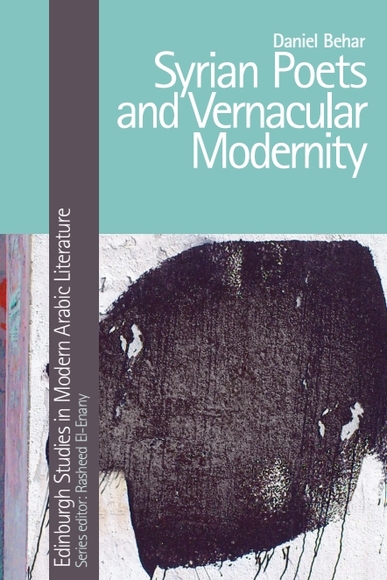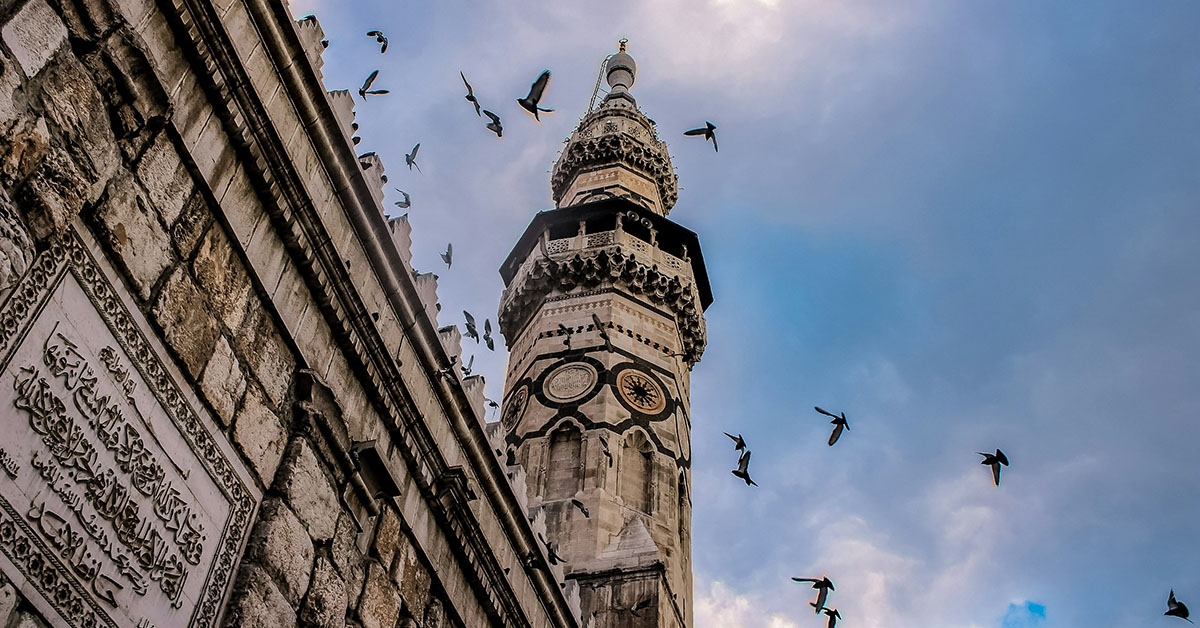
By Daniel Behar

Daniel Behar is the author of Syrian Poets and Vernacular Modernity, which closely examines a wealth of primary poetic texts from Syria that make up a new poetics to challenge received ideas about modern Arabic poetry.
How did Syrian Poets and Vernacular Modernity first come into being? Can you talk a little about your journey with Syrian poetry, and with the 1970s in particular? What’s significant about this period, poetically?
The book was conceived nine years ago during a five-day vacation in Paris. I was a doctoral student trying to design a research plan that would reflect my double commitment to comparative literary study and to modern Arabic poetry, the prose poem especially. I met intensively with the Syrian poet Saleh Diab whose rambling monologues on Syrian poetry carried us through long walks in Parisian neighborhoods entirely oblivious to the surroundings. As names and book titles kept dropping, I was shocked to realize how little I knew about poetic culture in Syria beyond Adonis and Muhammad al-Maghut. It was then that I picked up three key references from which my book ultimately emerged: Jamal Barut’s critical work Al-Shiʿr Yaktubu Ismah (Poetry Writes its Name, 1981), ʿAbbas Beidoun’s essay ‘Al-Sulala al-Maghutiyya’ (The Maghutian Lineage, 1990) and the Syrian journal of world literature Al-Adab al-Ajnabiyya (Foreign Literatures Quarterly, 1970-) which provided me with the translation material which I interpret as quasi-originals. Thereafter came the idea of an intertwined vernacular or shafawiyya composed of both local and transnational elements, an apparent contradiction which Syrian poetic culture embodies.
The journey began four years prior to this when I read a Hebrew translation of Diab’s poem Attaṣilu bi-l-riwāʾī (‘I Call Up the Novelist’). I loved the vulnerable, disarming persona, the jumpy dynamic lines, and the bumpy texture. I have always been drawn to rougher poetic idioms that, so to speak, take the silk gloves off and are undeterred from adopting the mundane. So I did just as the poem suggests: I called up the poet to learn what enabled him to write as he did. The existence of a tradition of antipoetic poetry within Arabic modernism was invisible to me at the time. Then I learned how hugely formative was Muhammad al-Maghut – rather than Adonis – for the bohemian generation of the seventies. The Syrian seventies saw a barely noticeable and yet momentous shift from committed national poetry to a civilian poetic ethos of comradery, conversational intimacy, tightly knit group solidary counterposed to the bland ideologies of solidarity on offer in official discourse. Shafawiyya is ‘lip’ poetry in the most literal and immediate sense that the site of belonging was relocated to one’s body and other nearby bodies in the company of which one rolls around through the inscrutable fate which Asadism brought on the country. When collective erasure of the individual person takes over, poetry is compelled to engrave a definitive shape to ephemeral memories, thoughts, joys, petty peeves of passing experience. These forms of memory and feeling are what these poets – like few Arab poets before them – passionately pursue with the help of emulative models such as al-Maghut’s ‘boisterous’ texts.
How did you choose the poets and poems you wanted to focus on? Throughout, you seem to savor apparent contradictions (cosmopolitan nationalism, a trans-national vernacularism). With global artists such as Nizar Qabbani and Muhammad al-Maghut, for instance, how would you describe what is particularly local and ‘Syrian’ about their poetic style?
As to Qabbani, I reckon that because he has become such an all-Arab icon, celebrated everywhere from Algeria to Saudi Arabia, people tend to forget the extent to which he is Syrian. For instance, the task of crafting a unifying and inclusive idiom in fuṣḥā – a felicitous modern style of love-talk which will go straight to the heart – is a giveaway sign of Arabic language ideology in Syria, as Yasir Suleiman has shown. This is because of the enormous diversity of Syrian ethnic and religious communities. Syria today still lives in the shadow of the failure of this project. It is clear how high the stakes were to shape Arabic as a democratic mediating vehicle between the various communities. Qabbani’s semi-hidden cosmopolitanism was achieved while he was on diplomatic duty on behalf of the Syrian republic, a mission on which he was sent because he was deemed a potential troublemaker to the iron-fisted regime of the army officers. His career is riddled with contradictory impulses in both aesthetics and politics. Qabbani embraces a socialist vocabulary for his self-presentation while depicting a bourgeois consumerist lifestyle in his love poems. He doesn’t necessarily reflect on these contradictions very deeply, but he embodies them exquisitely. They drive him unconsciously in powerful ways.
The reason I discuss Qabbani is that the book needed – for the ambitious magnitude of the intervention – a towering figure of Syrian modernity, a role which Adonis could not fill due to his ideological effacing of Damascus. I chose the poets and poems by a combination of two main factors: the ones critics singled out as generating the Maghutian lineage and the dictates of my own taste, that is, which texts and poets gave me the most pleasure in reading. This is how Monzer Masri gradually rose as the protagonist of the book. Jamal Barut mentions him on par with the others, but the deeper I studied his corpus, the more I admired the refinement in lowkey modes of poetic thinking while working in highly adverse political conditions. And the innovative project of devising a collaborative collage in Monzer Masri and His Associates (2011) – poems composed only with lines from the texts of his Syrian peers – is unmatched in world poetry and deserves to be studied for its own merit.
This Q&A is an extract from a longer interview that Daniel Behar gave to ArabLit. Dive into ‘Reading Syrian Poetry: A Conversation with Daniel Behar’ to gain even further insight into the process of writing Syrian Poets and Vernacular Modernity.
About the author
Daniel Behar is Assistant Professor of Modern Arabic Literature in the Department of Arabic Language and Literature at the Hebrew University of Jerusalem. He is interested in comparative analysis of modern Arabic poetry, theories of translation, and socialist literary imaginaries in Syria.






